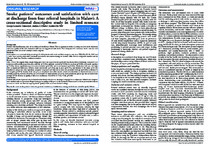Stroke patients’ outcomes and satisfaction with care at discharge from four referral hospitals in Malawi: A cross-sectional descriptive study in limited resource
Date
2018Author
Chimatiro, George Lameck
Rhoda, Anthea J.
De Wit, Liesbet
Metadata
Show full item recordAbstract
BACKGROUND
Stroke is the fourth leading cause of mortality and disability in Malawi. There is paucity of studies reporting on acute stroke functional
outcomes, quality of life and satisfaction with care among patients with stroke. This study aimed to determine stroke outcomes and
satisfaction with care in the country’s central hospitals.
METHODS
A descriptive cross-sectional study, recruiting 114 adult patients with stroke and their caregivers, was done. FIM, EQ-5D-5L, SASC and
C-SASC were used to collect data. Univariate associations were assessed using the Kruskal-Wallis Test for categorical variables and the
Wilcoxon Rank Sum Test for continuous variables.
RESULTS
With 79% of the original study sample taking part, there was improvement in patients’ functional status at discharge compared to on
admission with notable improvement in self-care (p<0.001), sphincter control (p<0.001), locomotion (p<0.001), and social cognition
(p<0.001), but no significant improvement in transfers (p=1.000), and communication (p=0.865). Satisfaction with care was high,
with no significant differences between males and females (p=0.415), age in years (p=0.397), and distance to the clinic (p=0.615).
Satisfaction ratings were also high from caregivers’ responses and their scores were not associated with age (p=0.663) or distance to
the hospital (p=0.872). Quality of life was poor, most patients were either unable or had severe limitation in functional dimensions of
mobility (22(28%), self-care (19(25%) and performance of usual activities (25(33%). Every additional year in age was associated with
average of 0.36 decrease in quality of life score coefficient, -0.36 (95% CI: -0.63; -0.10); p=0.008.
CONCLUSION
Patients with stroke experience improvement in functional outcomes on discharge compared to on admission. Patients and caregivers
were satisfied with care provision despite having poor quality of life post stroke treatment. There is need to focus proven interventions
on areas of stroke care that can impact patients’ quality of life in resource limited settings.

